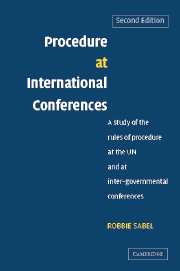 Procedure at International Conferences
Procedure at International Conferences Book contents
- Frontmatter
- Contents
- Preface to the second edition
- List of abbreviations and conference references
- Introduction
- 1 Historical development of rules of procedure of conferences and attempts to establish model rules
- 2 Adoption of rules of procedure
- 3 Rules of procedure and international law
- 4 Invitations, participation and credentials
- 5 Presiding officer and other officers of the conference
- 6 Meetings
- 7 Statements by delegations
- 8 Submission of proposals
- 9 Adjournment and closure of debate
- 10 Amendments
- 11 Withdrawal and reconsideration of motions
- 12 Procedural motions and points of order
- 13 Priorities between different proposals
- 14 Decision taking and method of voting
- 15 Majority required
- 16 Consensus
- 17 Separate votes
- 18 Conduct of voting – interruption of voting and correction of vote
- 19 Languages, records and documents
- 20 Committees
- 21 Suspension and amendment of rules of procedure
- Bibliography
- Index
18 - Conduct of voting – interruption of voting and correction of vote
Published online by Cambridge University Press: 22 July 2009
- Frontmatter
- Contents
- Preface to the second edition
- List of abbreviations and conference references
- Introduction
- 1 Historical development of rules of procedure of conferences and attempts to establish model rules
- 2 Adoption of rules of procedure
- 3 Rules of procedure and international law
- 4 Invitations, participation and credentials
- 5 Presiding officer and other officers of the conference
- 6 Meetings
- 7 Statements by delegations
- 8 Submission of proposals
- 9 Adjournment and closure of debate
- 10 Amendments
- 11 Withdrawal and reconsideration of motions
- 12 Procedural motions and points of order
- 13 Priorities between different proposals
- 14 Decision taking and method of voting
- 15 Majority required
- 16 Consensus
- 17 Separate votes
- 18 Conduct of voting – interruption of voting and correction of vote
- 19 Languages, records and documents
- 20 Committees
- 21 Suspension and amendment of rules of procedure
- Bibliography
- Index
Summary
Interruption of voting
All rules of procedure recognise the principle that voting should not be interrupted except on a point of order concerning the actual conduct of voting. At the UNGA the rule has been interpreted that once voting on elections has begun, no campaigning or distribution of campaign material is allowed.
Interruption when voting on individual proposals
The 1960 Law of the Sea Conference adopted the Secretariat's proposal for the inclusion, in the article on conduct during voting, of the following definition:
Rule 38
Conduct during voting
2. For the purpose of this rule ‘voting’ refers to the voting on each individual proposal or amendment.
A discussion took place on a Mexican amendment to omit this definition from the rules applicable to committees. During the discussion, the representative of the Secretariat explained the background to the definition, stating that:
[A]lthough the substance of the new paragraph 2 of rule 38 was not explicitly stated in rules 90 and 129 of the General Assembly's rules of procedure – on conduct during voting – the Secretariat's intention had been to stress the importance of completing the voting on individual proposals and amendments. At the General Assembly and at international conferences held under United Nations auspices, delegations often submit documents described as a proposal, consisting of a series of proposals or amendments. Such composite proposals had sometimes been regarded as a single proposal for the purpose of voting, and difficulties had arisen when a number of separate amendments or proposals were not intimately linked and the process of voting could not be finished until the series had been exhausted.
- Type
- Chapter
- Information
- Procedure at International ConferencesA Study of the Rules of Procedure at the UN and at Inter-governmental Conferences, pp. 370 - 394Publisher: Cambridge University PressPrint publication year: 2006


